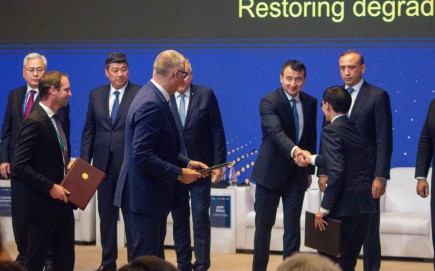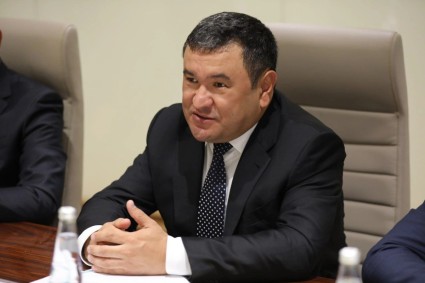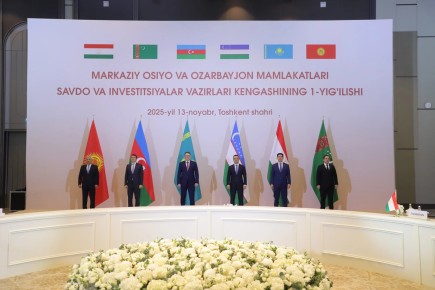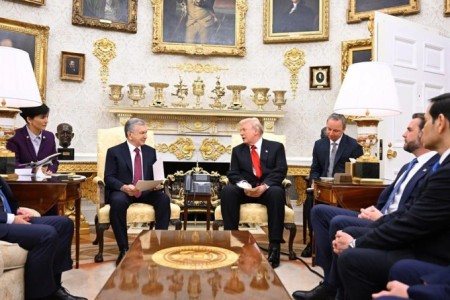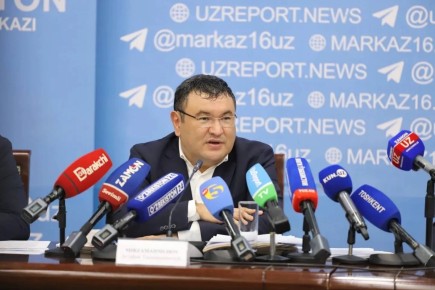The Ministry of Economy and Finance unveiled the proposed tax rates in the draft 2025-2027 Uzbekistan budget. Current rates of income tax (15%), personal income tax (12%), social tax (budget organizations - 25%, others - 12%), turnover tax rate - 4%, as well as fees for the transit of cars through the territory of the country and fees for the right to sell alcoholic beverages will remain the same in 2025.
While, the rates of VAT (12%), land tax for agricultural land (0.95%), property tax for legal entities (1.5%), the tax rate on the volume of water used for irrigation of agricultural land and fish farming, without meters (100 soums), in the absence of meters and water-saving technologies, an increasing coefficient of 1.1 will be applied to the rate (currently - 1.5).
Changes
From January 1, 2025, the draft proposed to cancel the 10% ad valorem excise tax on filter cigarettes and increase the rate for the domestic market by 19.7% - up to 300 thousand soums (currently - 250.7 thousand soums), for imported cigarettes - 330 thousand soums (+ 1.5%, currently - 325 thousand soums). From July 1, the draft proposed to unify the excise tax rates on cigarettes, setting it at 340 thousand soums per 1,000 pieces for local and imported goods.
The document says that this measure is aimed at supporting a healthy lifestyle and unifying excise tax rates in accordance with the requirements of the World Trade Organization.
The World Health Organization recommends increasing the share of excise tax in the cost of cigarettes to 60%. After the increase, it is expected that the excise tax on an average pack of cigarettes will be 34% of its cost.
From January 1, the draft proposed to increase excise taxes on other tobacco products: on nicotine-containing liquid (for vapes) by almost 3 times - up to 2,000 soums per 1 ml (instead of 670 soums), cigars - 20 thousand soums per piece (instead of 6,400 soums), heated tobacco - 450 thousand soums per 1 kg (instead of 382 thousand), smoking tobacco - 600 thousand soums per 1 kg (instead of 382 thousand).
From January 1, for local alcoholic beverages (vodka, cognac, etc.), the excise tax rate will be indexed by 10% and will amount to 44 thousand soums (instead of 40 thousand) per 1 liter of alcohol, and for imported goods it will be reduced by 25% - from 101.5 thousand to 76 thousand soums.
The excise tax on ethyl alcohol for local and imported production will be unified and will amount to 15 thousand soums per liter (previously 14.9 thousand and 70%). The calculation of excise tax for grain distillates and ethyl alcohol used for the production of industrial alcohol is being clarified. The standard for grain distillates assumes an ethanol content of 52%.
Unification of rates is also proposed for wines. For natural wines, the excise tax on local wine will be 5,000 soums per liter (instead of 1 soum), on imported wine - 14 thousand soums (instead of 28.5 thousand), and on other wines - 6,000 soums for local (instead of 2,310 soums) and 20 thousand soums for imported (instead of 40.6 thousand soums).
The excise tax on beer has proposed to be set at 2,000 soums per liter for local and 6,000 soums for imported. Currently, these rates are 1628 and 50% (but not less than 12.2 thousand soums).
From April 1, excise taxes on oil products (gasoline, aviation kerosene, diesel fuel, ecofriendly diesel fuel), engine oils and liquefied and compressed gases are proposed to increase by 10%, which "will not have a significant impact on their retail prices," the draft says.
From April 1, the draft proposed to extend the excise tax to all non-alcoholic beverages containing sugar. An excise tax of 500 soums per 1 liter has proposed to be set on non-carbonated sweet teas, fruit juices, compotes produced industrially, and other non-carbonated sweet drinks containing sugar (fruit drinks, lemonades, kvass).
The draft proposed to reduce the excise tax on carbonated and non-carbonated drinks containing sweeteners or flavoring agents from the current 500 to 300 soums per liter. This applies to diet carbonated drinks, where a sugar substitute is used instead of sugar.
From January 1, the draft proposed to increase by 10% the tax rates for the use of water resources for water users, including power plants, utilities, producers of soft drinks and alcoholic beverages, except for beer and wine, and industrial enterprises. In accordance with the presidential decree (PP-107) dated April 1, 2023, the tax rates on water for other sectors will be gradually unified with industrial tariffs.
The water tax for car washes will be raised by 5.5 times - from 2,700 to 15 thousand soums per 1 cubic meter.
The draft proposed to set separate tax rates for the use of subsoil resources for marble, granite, natural facing stone, sand and gravel mixtures (including construction sand and sandstones), given that the share of tax in relation to their purchase price is very low.
While, it has proposed to increase fixed rates of mineral extraction tax for mining and chemical raw materials and other non-metallic building materials by 10%.
From January 1, in order to increase the revenues of local budgets, it has proposed to index the property tax on residential and non-residential real estate of individuals and legal entities by 10% (councils can apply reduction factors of up to 0.5).
It also proposed to increase the basic rates of land tax for legal entities and individuals by 10%.
For e-commerce companies in goods, works and services (marketplaces), it has proposed to increase the income tax rate from 7.5% to 10%, and the turnover tax from 2% to 3%. In 2023, the total turnover of such entrepreneurs within the framework of e-commerce topped 3.6 trillion soums (in 2022 - 3 trillion soums). Tax incentives topped 20.1 billion soums for income tax (in 2022 — 25.1 billion) and 1.9 billion soums for turnover tax (in 2022 — 1 billion).
From January 1, 2025, the excise tax on mobile communication services will be canceled.
The draft also proposed to cancel the excise tax on imported gas (5%) and reduce the excise tax rate on gas from 20% to 12%. At the same time, it has proposed to return the excise tax for imported gas and set the rate at 12%.
The fixed turnover tax rates adopted in 2023 are proposed to be raised. They will be valid until January 1, 2026.


